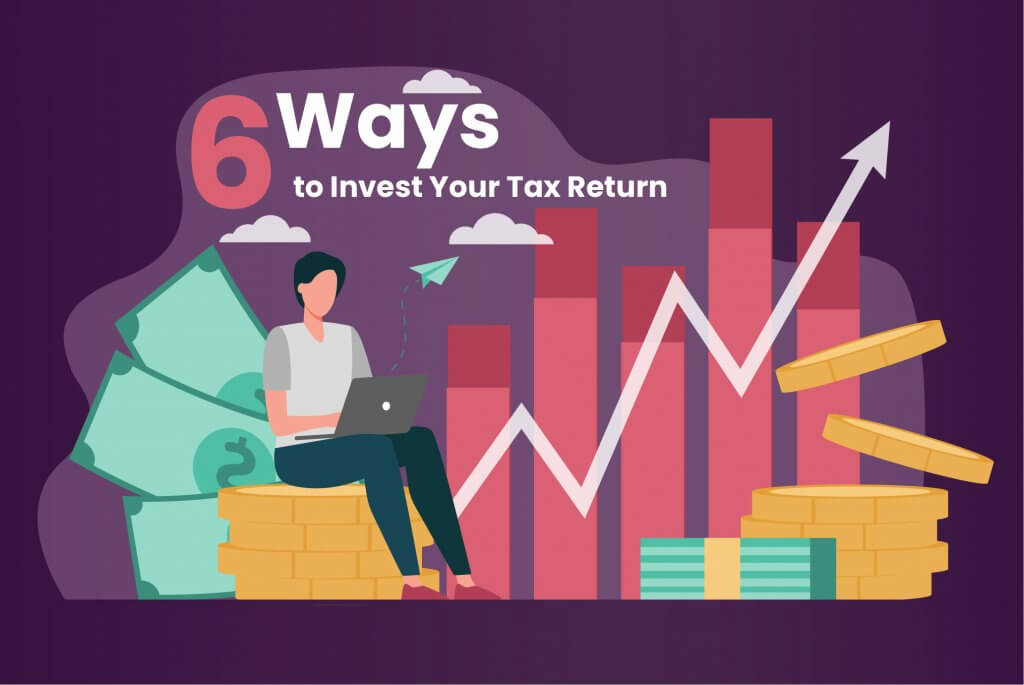If you’re in the process of filing your 2020 tax return, be prepared for the outcome to look a little different this year. Millions of Americans have received additional financial support from the federal government during the 2020-2021 fiscal year. While this financial boost acted as a life raft for most during the COVID-19 outbreak, it’s time to “return” the favor. Taxpayers are realizing the nationwide handout was from the White House was not on the house, and that these lump sums are also treated as taxable income. That being said, it may take strategy to invest your tax return this year, but it’s worth it in the long run.
The IRS issued over $200 billion in stimulus checks this year. If you did not qualify for the dual-issued stimulus and remain in the same income bracket, chances are your tax refund will look similar as it did in 2019. If you did qualify and are seeing a reduction in your tax return, have no fear.
While the earning potential of median-income Americans makes its way back to normal over the next fiscal year, you can take a step forward by investing your tax return wisely. Members Exchange Credit Union is here to help you build back your earnings. Here are six ways you can kick start your investments with your tax return:
1. Pay Off High-Interest-Rate Credit Card Debt
Of all the options listed below, paying off any high-interest debt is your best bet to invest your tax return and start fresh with a financially clean slate in 2021. As painful as it may be, accumulating more debt while attempting to invest on the side will be more difficult in the long run. This a guaranteed, risk-free way to “invest” in your financial future.
So, how is paying off debt investing? Let’s say your interest rate is 16%. For every dollar you spend, your return of investment is equivalent. At 16%, this is much higher than you would likely receive on your investments in the market.
Perhaps you would like to invest in your two largest loans: student loans or home mortgages. While this can be beneficial to get a head start on your accrued interest, it’s important to keep your highest interest rate loan down first. Paying down the debt that accrues the most interest will keep your overall payments down.
2. Start an Emergency Fund
You may be wondering, how is an emergency fund going to improve my current financial situation? Given the economic hardships faced in 2020, the need for a nest egg has never been more apparent. If you’re able to and have successfully paid off your debts, this option is great to apply simultaneously with the remaining investment methods listed below.
An emergency fund consists of anywhere from 3-6 months of living expenses in liquidity, but even one month is better than nothing. Stowing away your tax refund now can mean 2-3 mortgage payments later down the line if a crisis unfolds. In terms of every day “surprise” expenses, it could be helpful to have investment saved for when you’re in need of a costly car repair, medical bill, or legal fees. You may not receive much return on your investment, but the emergency fund will be there when you need it.
3. Open a Health Savings Account
Health Savings Accounts (HSAs) are triple tax-free investments that you can use for any medical-related need. This means that money from your paycheck is added to the HSA pre-taxed. Your investment sits taxed-free and is taxed upon withdrawal only if you use it for something other than medical needs.
There are requirements to having a Health Savings Account. In order to open an HSA, you must first have a high-deductible insurance plan, meaning, your HSA can not replace health insurance. It can however offset the out-of-pocket costs associated with your deductible.
4. Increase Your 401(k) Workplace Retirement Investments
If you have already worked to reduce your credit card debt, ensuring your financial future when you invest your tax return into your 401(k) will go a long way. Employers offer matching for a reason, and it’s best to take advantage of this opportunity while your working years are in front of you.
Another way to add to your 401(k) after-tax season is to decrease your withholding. Be sure to invest that money back into your retirement savings so you aren’t sitting on an amount that could be matched at 3-6%.
5. Contribute to an IRA
An IRA (Individual Retirement Account) acts as a solution to those who do not have access to employer-matched 401(k) retirement savings. With or without the assistance of your employer, it’s important to have retirement savings, and IRAs can help get you there.
There are two options for you to choose from: a Roth IRA or a traditional IRA. The difference between the two is that one is taxed upfront and the other is taxed once you remove funds from the account. A traditional IRA is tax-deferred until you begin taking withdrawals which you can do at the age of 59.5 and must do by the age 70.5. The opposite is true for a Roth IRA, meaning the money in your account is tax-free until withdrawn, and withdrawals are not mandatory. You can remove funds from your account at any time and for a variety of purposes, but will be penalized up to 10% alongside tax-deferral for doing so if removed before age 59.5.
Interested in starting an IRA? Learn more about our traditional, Roth, and educational IRAs here.
6. Invest in the Stock Market
Last but not least, once your retirement fund is established, investing in stocks or mutual funds is a great way to earn a return on your income. The stock market has historically given back more in return than savings or Treasury bonds. Be careful and start small. The market is volatile and returns are not guaranteed like other investment methods.
It may be wise to hire a financial advisor or freelance stockbroker before diving into the market; however, you can dip your toes in by investing in penny stocks first. Advisors will tell you to pursue long-term investments like mutual funds to increase your retirement savings rather than short-term savings through stock investments. One thing to keep in mind is that your investments are not protected by the same federal agencies as your checking and savings accounts are. The Federal Deposit Insurance Corporation (FDIC) will not supplement your investments if the stock market crashes.
Invest in Your Future at Members Exchange Credit Union in Jackson, MS
As you can see, there are many ways to put your 2020-2021 tax return to use and get ahead for the following fiscal year. Depending on whether your credit card debt is settled, each tax year can be a jump start to investing in retirement, emergency savings, or external funds like the stock market. At Member’s Exchange Credit Union, we’re here to help you invest your 2020 tax return wisely. That being said, if you aren’t already a member with us, sign up today. Before making any of these investments, it’s important to bank with a local credit union that has your back. If you’re in the Jackson, MS area, take it from us, your future looks brighter with MECU.










